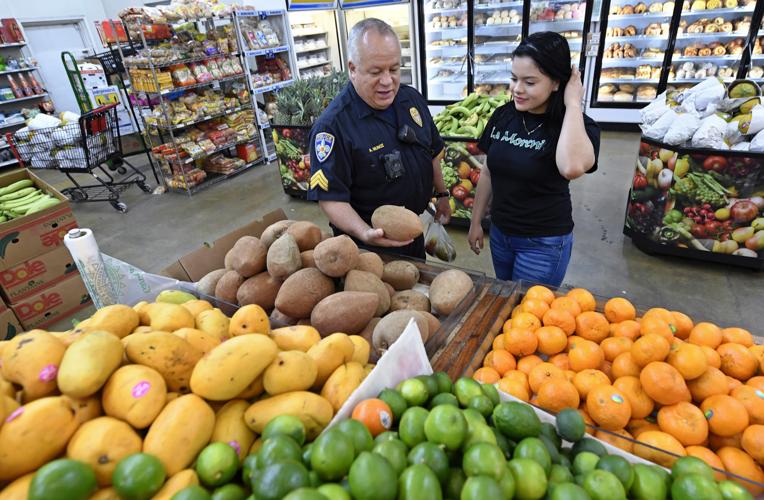Arthur Muñoz was 6 years old when his family left Mexico and immigrated to the United States. He started first grade in California speaking almost no English.
But before long he was fluent enough to start translating for his mom — a single parent introducing her children to the American dream.
Muñoz joined the Baton Rouge Police Department almost 25 years ago after moving to Louisiana with his wife. He's living his own American dream now, but hasn't forgotten how he got here.
One of four native Spanish speakers on the Baton Rouge police force, he's trying to build bridges between police and Hispanic residents who are often fearful of authorities.
Those fears have grown since President Donald Trump campaigned and won on an anti-immigration platform and has pursued more aggressive enforcement of federal immigration laws.
Advocates and leaders of Baton Rouge's Hispanic community are worried that their people are being targeted for theft and other crimes, in part because the perpetrators think immigrants are less likely to call 911 after being victimized.
Muñoz said the concerns are legitimate. That's what fuels his efforts to educate people on their rights and the duties of law enforcement officers, which is first and foremost to protect and serve.
"Most of these people are running from horrific conditions in their home countries, and that includes corrupt governments and corrupt police," he said. "Then instead of a helping hand, they're being victimized all over again in America. … We need them to know that as police we're here to help, but we can't do anything if they're not calling us."
Growing concerns
Last month a Honduran immigrant was gunned down outside his Baton Rouge apartment complex in an apparent armed robbery that remains unsolved.
Alex Lemus, 23, had immigrated five years earlier fleeing violence in Honduras. He moved to Baton Rouge for job opportunities and started working as a painter, then met his future wife and became a father. Lemus was leaving for work the morning of March 25 when someone approached him with a gun and pulled the trigger, ending his life.
His death raised questions about how to address the growing problem of crimes that appear to target immigrants in the Baton Rouge area.
The young man who was gunned down outside his apartment complex in an apparent armed robbery Monday morning had immigrated to the U.S. from Ho…
A similar case unfolded last year in the city's Gardere neighborhood when two Hispanic men became victims of an armed robbery and shooting, which left one dead. A teenager has since been arrested and indicted in that case.
Members of the Hispanic community — which makes up about 4 percent of the parish's population — said they're often targeted in robberies because many carry cash instead of keeping their money in a bank account. They do so either because they're not used to dealing with banks in their home countries or because they don't have the documentation necessary to open an account.
Although the community has grown in recent decades, it remains a small segment of East Baton Rouge residents. Recent estimates show the parish is now home to about 18,000 Hispanic residents.
The Hispanic Apostolate of the Baton Rouge Diocese has taken action since Lemus' death, trying to dissuade fears of law enforcement and is encouraging people to report crimes they witness.
"There are people being shot in their own homes, afraid to call police," said Julia Scarnato, executive director of the Hispanic Apostolate. "People in car accidents afraid to visit hospitals. Things in Baton Rouge have gotten pretty bad."
A suburban Baton Rouge library took on a Latin American cast Saturday as dozens of residents of Hispanic descent gathered to celebrate their c…
What is 287(g)?
Hispanic leaders said convincing immigrants to trust police has become more difficult for various reasons, including an agreement signed in 2017 between the East Baton Rouge Sheriff's Office and the U.S. Immigration and Customs Enforcement, or ICE.
The Sheriff's Office is the only law enforcement agency in Louisiana — but one of dozens across the country — with a current 287(g) agreement.
The program, which has grown under the Trump administration, allows some local law enforcement officers to fulfill duties otherwise assigned to ICE agents. But its jurisdiction is limited to inmates of local jails who have already been arrested and detained on other alleged crimes unrelated to citizenship.
Even if an inmate is found to be undocumented, authorities said, the seriousness of the offense is considered when determining whether to begin deportation proceedings.
East Baton Rouge Sheriff's Office spokeswoman Casey Rayborn Hicks said it's important to realize that the agency does not have deputies charged with enforcing immigration laws against members of the general public who haven't been booked into jail.
The agreement includes training for some deputies that allows them to check the federal immigration status of Parish Prison inmates. Hicks said it doesn't change how laws are enforced, just who's responsible for enforcement.
"Prior to 287(g) the warden stated ICE had a representative stationed at the prison that carried out the same functions," Hicks said in an email. "The only difference now is that certain prison staff are trained to collect certain information pertaining to citizenship under the supervision of ICE."
Despite what officials described as minimal changes resulting from the expanded program, immigration advocates said agencies risk damaging their relationship with the public when they choose to collaborate with federal immigration authorities.
"Having these agreements with ICE makes it difficult for people to trust whether local agencies are acting in the best interest of residents," said Christy Williams, an attorney with the Catholic Legal Immigration Network. "It's the primary responsibility of local officials to make sure that their community feels safe and comfortable interacting with them — with as little fear as possible."
The American Civil Liberties Union released a national report last year showing that heightened fear of deportation was stopping immigrants from reporting crimes and participating in court proceedings.
Researchers said 67 percent of police officers surveyed reported an impact on their ability to protect crime survivors generally.
Prosecutors also reported that crimes including domestic violence, sexual assault, and human trafficking were harder to investigate and prosecute because immigrant crime survivors feared immigration consequences if they came forward.
Rebuilding trust
Both Baton Rouge police and the East Baton Rouge Sheriff's Office said they want to improve relations and engage in outreach whenever possible, though manpower issues sometimes limit those efforts.
Muñoz, the Baton Rouge police officer, said one of his missions is to make sure members of the Hispanic community know their rights — most importantly that they can report a crime without facing questions about their immigration status.
Officers will often ask for identification when taking down witness statements, but people have the right to remain anonymous or decline to provide photo ID. There are also federal programs that allow undocumented crime victims to obtain either temporary or permanent legal status, particularly for victims of violent crime who agree to cooperate with police and prosecutors.
"There are so many rumors about people being deported, local law enforcement working for ICE, checkpoints, you name it," Muñoz said. "But nothing has really changed."
He said the department is actively recruiting more Spanish speaking officers. But in the meantime, Muñoz is doing his part to bridge the gap — passing out his cell number, frequenting Latino businesses, hosting radio shows on local Spanish stations and answering questions from the public.
"I'm very fortunate to be entrusted with this job, and someone's gotta do it," he said. "I too came here without the language. I remember that. … If I can possibly help one or two people along the way, that's a good thing."
DENHAM SPRINGS — On a recent afternoon, Martha Gonzalez's two youngsters ran back and forth across her narrow street in Eastover Estates, chat…












